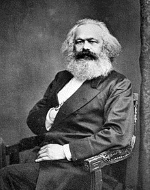Marx, Engels and Ireland Historian In Residence Blog
Published on 23rd October 2018
 As the world commemorates the 200th anniversary of the birth of Karl Marx, it may come as some surprise to hear that both Marx and Fredrich Engels, authors of The Communist Manifesto and creators of modern-day Marxist thought, were both strong proponents of Irish independence. In November 1867 Marx wrote that what Ireland really required was ‘Self-government and independence from England, an agrarian revolution and protective tariffs against England’.
As the world commemorates the 200th anniversary of the birth of Karl Marx, it may come as some surprise to hear that both Marx and Fredrich Engels, authors of The Communist Manifesto and creators of modern-day Marxist thought, were both strong proponents of Irish independence. In November 1867 Marx wrote that what Ireland really required was ‘Self-government and independence from England, an agrarian revolution and protective tariffs against England’.
To Marx, an independent Ireland would weaken British imperialism, cut off a valuable source of agricultural resources and dent London’s prestige, while an economically successful Irish state would mean an end to emigration across the Irish sea, thus removing the sectarian and social tensions which prevented the British working class from achieving revolutionary consciousness. In Capital and other works, Marx developed the idea that the British economic system was deliberately impoverishing Ireland, dispossessing workers and replacing them with livestock, turning Ireland into an agricultural satellite of Britain, its only purpose to grow food for British workers. At the same time, Marx believed the government wanted poor Irish workers to emigrate to Britain, to stimulate competition and antagonism within the working class and to distract them from turning on the establishment. Marx’ daughters were also strongly pro-Irish and wrote journal and newspaper articles condemning British policy and its treatment of Fenian prisoners in British jails.
Engels had a deeper personal interest in Ireland. His long-time partner Mary Burns was an Irish emigrant whom he met in Manchester where he worked in his family-owned factory, and she opened his eyes to the conditions endured by Irish migrants to the city. Engels planned to write a history of Ireland, which essentially was a lengthy denunciation of British imperialism. Engels also visited Ireland twice, in 1859 and again in 1870. On his 1859 trip he landed in Dublin before travelling to Galway, Limerick, Tarbert, Tralee and Killarney. The country was still recovering from the Famine and Engels noted the amount of ruined and abandoned houses in the west. ‘The land is an utter desert’ he commented, ‘which nobody wants.’ He was unimpressed with Dublin, writing to Marx that the city had ‘the character of a small one-time capital, all English-built’ and that it bore ‘the same relation to London as Dusseldorf does to Berlin.’
Both Marx and Engels realised that Ireland was not yet ready to embrace communism. Writing in 1888, Engels pointed out that ‘A purely socialist movement cannot be expected in Ireland for a considerable time. People there want first of all to become peasants owing a plot of land, and after they have achieved that, mortgages will appear on the scene and they will be ruined once more’: a prediction that held true in 2008 as well as 1888.
Bernard Kelly, Historian in Residence, Dublin City Library and Archive.
Dublin City Council Historians in Residence are available to meet groups and schools, give talks, walks etc, run history book clubs and advise on historical research.